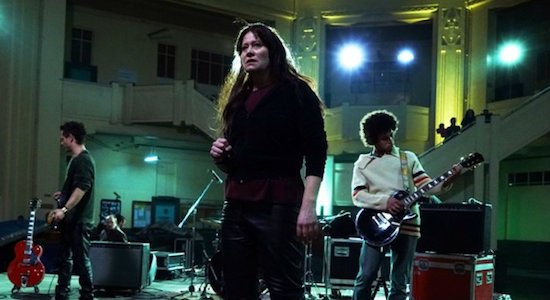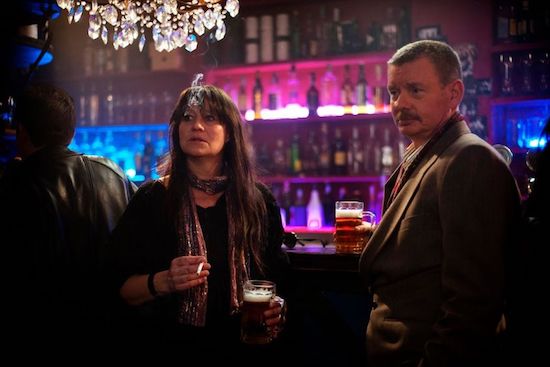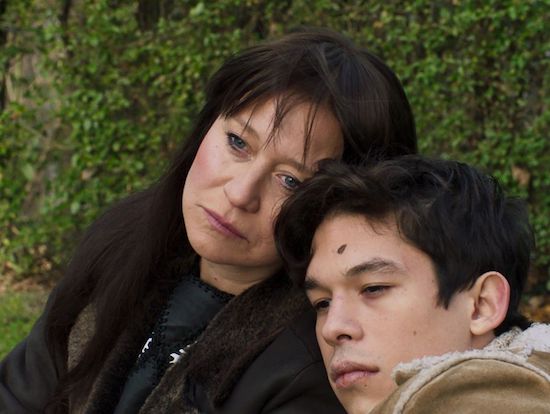Film: Icon in the Raw
A raw, unconventional film about the last years of iconic German musician/muse Nico, Susanna Nicchiarelli’s Nico, 1988 portrays its subject as an earthy, unglamorous woman and an uncompromising artist. It’s a far cry from the popular image of the icily mysterious chanteuse who performed with the Velvet Underground in the late 1960s, and that’s a big part of the movie’s fascination. As embodied with fierce intensity by Danish actor/singer Trine Dyrholm, Christa Päffgen (Nico’s real name) in her late 40s was as dismissive of her younger incarnation as Warhol figurine and rock star paramour as she was passionate about reconnecting with her troubled son, Ari. Nico, 1988 is a refreshingly unromantic portrait of a heavily romanticized persona.
Nicchiarelli based her loose, impressionistic film on actual events, including interviews with Nico that are recreated throughout. There are also hazy flashbacks, actual footage of the Velvet Underground and the young Nico, provided by filmmaker Jonas Mekas. In casting Dyrholm, who bears no physical resemblance to Päffgen, Nicchiarelli opts to create her own character for this story, which may not sit well with some diehard fans. Truer to history is the film’s sound, and Dyrholm, an impressive musician in her own right, nails Nico’s deep, stark vocals. (Dyrholm performs all songs in the film, including “These Days” and “All Tomorrow’s Parties.”)
Nico, 1988 begins in 1986, with the singer giving an interview in Manchester, England, where she lives and which she compares with post-WWII Berlin. (Throughout the film, she has flashbacks and memories of her childhood during the war, a major influence in her life and work.) She instructs club owner and soon-to-be manager Richard (a solid John Gordon Sinclair), “Don’t call me Nico; call me by my real name,” signaling her distance from the past. Richard, who is clearly devoted to the singer, finds her an apartment and arranges a European tour for what would be her last studio album. Still a heroin addict, she immediately shoots up in the bathroom of her new flat, but not before recording the noise of its water heater.
In another interview she talks about her son, Christian Aaron (“Ari”), though it clearly pains her. Raised by his paternal grandparents, he has been institutionalized after a recent suicide attempt. (The fact that actor Alain Delon was the boy’s father is never mentioned, in keeping with the film’s disinterest in Nico’s storied love life.)
We see several live performances of the singer performing her dark, droning music with a backing band of young musicians. Dyrholm injects these scenes with an almost palpable energy. During a show in Italy, Nico loses her temper and leaves the stage. Later, she makes up for the shortened set by performing a sublime version of “Nature Boy” with the hotel’s jazz combo. Here, as throughout the film, she’s unpredictable, as likely to crack a joke as to cut someone dead. Dyrholm captures her restless junkie distraction, eyes alternating between dull weariness and steely determination.
In one scene, Nico bonds with her Italian host, chowing down happily on spaghetti and Limoncello. Despite its generally somber subject matter, the film has a few light moments, some of its humor stemming from Nico’s almost childlike bluntness. Complicating the tour (and the movie) are an on-off liaison between Richard and his co-tour manager (Karina Fernandez), who remains unimpressed with Nico’s music; plus a romance between violinist Sylvia (Anamaria Marinca) and bassist Alex (Calvin Demba), though the latter’s heroin habit dooms the relationship.
In France Nico visits Ari (Sandor Funtek) at his psychiatric institution and there seems to be real affection between them. When the band reaches Prague, Nico and some of the others are jonesing for heroin. Richard makes inquiries, but the stuff is absolutely off-limits as the concert itself is illegal (ah, the days before the fall of the Iron Curtain). Despite—or maybe due to—their drug sickness, she and band perform an incendiary “My Heart is Empty” to a huge, roaring crowd before the show is shut down by the authorities; it’s one of the film’s highlights and a scene that illustrates her onstage power.
By 1988, thanks to Richard’s efforts, Nico is on methadone and Ari has been sprung from the hospital and has joined the tour. Despite a devastating setback for him, things seem to be going relatively well by the end of the film, though we know that Nico is not long for the world.
Though messy and unfocused at times, Nico, 1988 is an audacious film made compelling by Dyrholm’s commanding performance.
Nico, 1988 opens at Film Forum on Wednesday, August 1.
—Marina Zogbi




